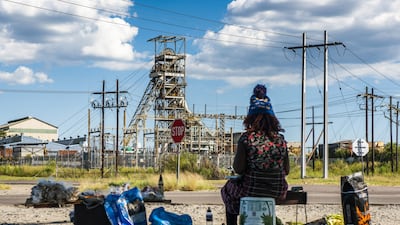South Africa’s worst power blackouts are threatening platinum and palladium supplies at the country's leading mining company, Impala Platinum Holdings, both now and in the years ahead.
Power cuts last year curbed output of the metals and the energy crisis that is crimping the economy has worsened in recent months. The nation’s platinum-group metal production will likely fall this year, the company said.
The electricity crunch is damaging South African industry and agriculture and blackouts are expected for at least two more years, jeopardising output in Africa’s most industrialised economy. It is yet another headache for major mining companies such as Anglo American Platinum, Sibanye Stillwater and Impala who have found it increasingly harder to run deep and ageing shafts.
“If things don’t get better soon then we are likely to have a worse period this year than last,” Impala spokesman Johan Theron said in an interview.
“If it gets worse it will get to a point when you have certain days where we will stop sending people underground.”
South Africa mines roughly 70 per cent of the world’s platinum and about 40 per cent of all palladium, according to Metals Focus. Both are used mainly in autocatalysts that cut emissions.
Output curbs could widen a global platinum shortage this year that Metals Focus forecasts to be the biggest in two decades, and add to an expected palladium deficit. Longer term, the power crisis is another worry for investors already wary of backing new mines as the electric-vehicle boom clouds demand prospects for platinum metals.
State-owned utility Eskom Holdings SOC cannot produce enough power from its old and poorly maintained plants. It imposed blackouts on more than 200 days last year and into this month.
Mining companies are scaling down some surface activities, then catching up when power supplies are less tight — sometimes during the night and weekends — Impala's Mr Theron said.

South African platinum-group metals output last year was probably on average 6 per cent below producers’ initial guidance and one of the worst in the past two decades, according to UBS Group analysts including Steven Friedman.
Platinum has rallied about 25 per cent since the start of September, when power cuts intensified, while palladium has retreated. Reduced output may help support prices, Mr Friedman said. But lower volumes could weigh on producers’ margins, at a time when they’re also facing inflationary pressures, he said.
Anglo American's platinum unit said it reduces power use when requested by Eskom during various levels of blackouts.
“Our operations are running at the capacity required and as stable as possible to support grid stability,” said Jana Marais, a spokeswoman for Anglo American Platinum.
“We have emergency response plans to manage risks and evacuate employees safely in the event of prolonged power outages.”
Worsening blackouts could lead to the early closure of some marginal shafts, Sibanye spokesman James Wellsted said.
The power crunch also risks stifling appetite to invest in future production.
“How do you develop a mine in an environment where you are not sure whether you have got power or not?” Mr Wellsted said. “Nobody is investing in replacement ounces or growth in the industry.”


